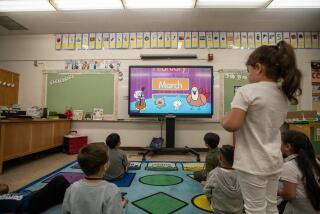School Can Be Scary, but Parents Can Help
- Share via
There are some life experiences you just never forget, and for many people the first day of school is high on that list.
Not only is school a new world, it also is for many youngsters their first lengthy separation from a parent. Some adjust to school quickly, but for others this maiden voyage into academia can be traumatic.
There are some ways, however, to reduce your child’s anxiety about the first day of school.
One of the toughest things about the first day is being surrounded by strangers.
The child will be more comfortable, though, if he or she knows at least one other student. Ask the school to help you contact the family of another child who will attend the school so that the children can play together a couple of times beforehand.
I believe you can help prepare for just about any challenge by reading a book about it, and there are a variety of storybooks about starting school. Reading one with your child can also help reduce his or her fear of the unknown.
Visiting the school ahead of time is helpful; point out the child’s classroom, bathroom, and where he or she will be picked up after school each day.
If you’re sending the child off with a new lunch box, wardrobe or other new things, “it may be a good idea to introduce (them) beforehand, not just on that first morning, so the child gets used to those objects,” said Ellen Nova, a child psychotherapist in Westwood.
The child’s morning routine will also probably change. Do a couple of “walk-throughs” before the big day. But, Nova warns, “Children don’t have a great concept of time, so (rehearse) as close to the first day as possible so they don’t forget.”
Once the big day arrives, the child’s most immediate fear will most likely be the separation from you.
Give them some security by letting them take to school some object, such as a photo or note, that reminds them of you. A favorite stuffed animal may also work.
If possible, stay in the classroom for a bit. “I’ve just seen too many parents who say, ‘No, you’re a big boy now, you’ll have to stay and I’m leaving,” “ says Sheila Phillips, a pediatrician in Santa Monica. “That’s the worst thing you can do.”
Before leaving, tell the child what time you’ll return--and then keep your word. “There’s nothing more frightening to a child than being the last one picked up,” Phillips says.
Saying goodby is easier if it’s a ritual, Nova adds.
“Do the same kind of thing every morning, whether it’s reading together, waving goodby or kissing all the stuffed animals,” she said.
How you end the first day is also important; celebrate it as you would a birthday or holiday.
The greatest reward you can give is your companionship, so grant a special trip to the library or the park or an extra bedtime story.
Praise the papers your child brings home each day, and post them in the house somewhere. “It may be just green pen across a piece of paper, (but) it’s special and it goes up on the refrigerator,” Phillips says.
Finally, leave time each day for the student to talk about school. You may have to “read between the lines” a little, since young children are often unable or unwilling to come right out and list specific problems or fears.
There’s something I find interesting about this process of readying your child for the first day: Many of these techniques can and should be used every day of every year of your child’s education.
Of course, high school seniors may not need photos of you tucked into their lunch boxes, and probably very few medical school students carry teddy bears their first day.
But students of all ages need a parent to reassure them about the next stage of schooling, celebrate even their smallest successes, listen to their feelings about school and show genuine interest in their studies.






